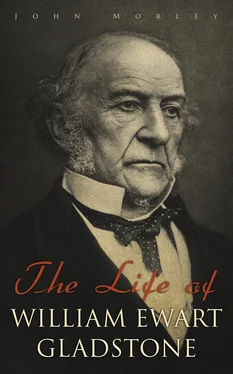THE TWO ANTAGONISTS
The writer in the Times to whom the victorious orator here refers describes how, 'like two of Sir Walter Scott's champions, these redoubtable antagonists gathered up all their force for the final struggle, and encountered each other in mid-career; how, rather equal than like, each side viewed the struggle of their chosen athletes, as if to prognosticate from the war of words the fortunes of two parties so nicely balanced and marshalled in apparently equal array. Mr. Disraeli's speech,' he says, 'was in every respect worthy of his oratorical reputation. The retorts were pointed and bitter, the hits telling, the sarcasm keen, the argument in many places cogent, in all ingenious, and in some convincing. The merits were counterbalanced by no less glaring defects of tone, temper, and feeling. In some passages invective was pushed to the limit of virulence, and in others, meant no doubt to relieve them by contrast, the coarser stimulants to laughter were very freely applied. Occasionally whole sentences were delivered with an artificial voice and a tone of studied and sardonic bitterness, peculiarly painful to the audience, and tending greatly to diminish the effect of this great intellectual and physical effort. The speech of Mr. Gladstone was in marked contrast. It was characterised throughout by the most earnest sincerity. It was pitched in a high tone of moral feeling—now rising to indignation, now sinking to remonstrance—which was sustained throughout without flagging and without effort. The language was less ambitious, less studied, but more natural and flowing than that of Mr. Disraeli; and though commencing in a tone of stern rebuke, it ended in words of almost pathetic expostulation.... That power of persuasion which seems entirely denied to his antagonist, Mr. Gladstone possesses to great perfection, and to judge by the countenances of his hearers, those powers were very successfully exerted. He had, besides, the immense advantage resulting from the tone of moral superiority which he assumed and successfully maintained, and which conciliated to him the goodwill of his audience in a degree never attained by the most brilliant sallies of his adversary, and when he concluded the House might well feel proud of him and of themselves.'
A violent thunderstorm raged during the debate, but the excited senators neither noticed the flashes of lightning nor heard a tremendous shock of thunder. A little before four o'clock in the morning (Dec. 17), the division was taken, and ministers were beaten by nineteen (305 to 286). 'There was an immense crowd,' says Macaulay, 'a deafening cheer when Hayter took the right hand of the row of tellers, and a still louder cheer when the numbers were read.' 275
DEFEAT OF GOVERNMENT
A small incident occurred a few nights later to show that it was indeed high time to abate the passions of these six years and more. A politician of secondary rank had been accused of bribery at Derby, and a band of tory friends thought the moment opportune to give him a banquet at the Carlton. Mr. Gladstone in another room was harmlessly reading the paper. Presently in came the revellers, began to use insulting language, and finally vowed that he ought to be pitched headlong out of the window into the Reform. Mr. Gladstone made some courteous reply, but as the reporter truly says, courtesy to gentry in this humour was the casting of pearls before swine. Eventually they ordered candles in another room, and left him to himself. 276'You will perhaps,' he wrote to his wife, 'see an account of a row at the Carlton in which I have taken no harm.' The affair indeed was trivial, but it illustrates a well-known and striking reflection of Cornewall Lewis upon the assault perpetrated on Sumner in the Senate at Washington by Brooks. 'That outrage,' he said, 'is no proof of brutal manners or low morality in Americans; it is the first blow in a civil war.... If Peel had proposed a law not only reducing rents, but annihilating them, instead of being attacked by a man of words like Disraeli, he would have been attacked with physical arguments by some man of blows.' 277
In point of numbers the stroke given to protection was not tremendous, but as the history of half a century has shown, it was adequate and sufficient, and Lord Derby at once resigned. He did not take his defeat well. 'Strange to say,' Mr. Gladstone wrote to his wife, 'Lord Derby has been making a most petulant and intemperate speech in the House of Lords on his resignation; such that Newcastle was obliged to rise after him and contradict the charge of combination; while nothing could be better in temper, feeling, and judgment than Disraeli's farewell.' Derby angrily divided the combination that had overthrown him into, first, various gradations of liberalism from 'high aristocratic and exclusive whigs down to the extremest radical theorists'; second, Irish ultramontanes; and lastly, a party of some thirty or thirty-five gentlemen 'of great personal worth, of great eminence and respectability, possessing considerable official experience and a large amount of talent—who once professed, and I believe do still profess, conservative opinions.'
Mr. Disraeli, on the contrary, with infinite polish and grace asked pardon for the flying words of debate, and drew easy forgiveness from the member whom a few hours before he had mocked as 'a weird sibyl'; the other member whom he would not say he greatly respected, but whom he greatly regarded; and the third member whom he bade learn that petulance is not sarcasm, and insolence is not invective. Lord John Russell congratulated him on the ability and the gallantry with which he had conducted the struggle, and so the curtain fell. The result, as the great newspaper put it with journalistic freedom, was 'not merely the victory of a battle, but of a war; not a reverse, but a conquest. The vanquished have no principles which they dare to assert, no leaders whom they can venture to trust.'
270.Charles Wordsworth, Letter to Mr. Gladstone , 1852, p. 50.
271.Inglis, 1368; Gladstone, 1108; Marsham, 758.
272.I suppose this refers to a passage about Mr. Disraeli:—'For my part I acquit the chancellor of the exchequer, so far as his own convictions are concerned, of the charge of having ever been a protectionist. I never for one moment thought he believed in the least degree in protection. I do not accuse him of having forgotten what he said or what he believed in those years. I only accuse him of having forgotten now what he then wished it to appear that he believed.' The same speech contains a whimsical reason why the Jews make no converts, which the taste of our more democratic House would certainly not tolerate.
273.'The only serious misunderstanding I ever had with my noble and lamented friend Lord George Bentinck, which I am happy to say was thoroughly removed before his untimely death—was upon a full and frank expression of my opinion that nothing could be more unfitting nor more impolitic than to load with terms of vituperation those from whom we are compelled conscientiously to differ' ( Dec. 6 ).
274.'We had a preliminary debate to have the whole resolution put, instead of the preamble only, which was ultimately agreed to, and placed the question more fairly before the public, Disraeli making the extraordinary declaration that though the proposal was for doubling the house-tax, nobody was bound by that vote to do so. It was an attempt at a shuffle in order to catch votes from his own people, and to a certain extent it succeeded.'— Halifax Papers , 1852.
275.Trevelyan, ii. p. 331.
276. Times , Dec. 23, 1852.
277. Letters , p. 315.
BOOK IV
Конец ознакомительного фрагмента.
Текст предоставлен ООО «ЛитРес».
Читать дальше









![William Frith - John Leech, His Life and Work. Vol. 1 [of 2]](/books/747171/william-frith-john-leech-his-life-and-work-vol-thumb.webp)


![William Frith - John Leech, His Life and Work, Vol. 2 [of 2]](/books/748201/william-frith-john-leech-his-life-and-work-vol-thumb.webp)